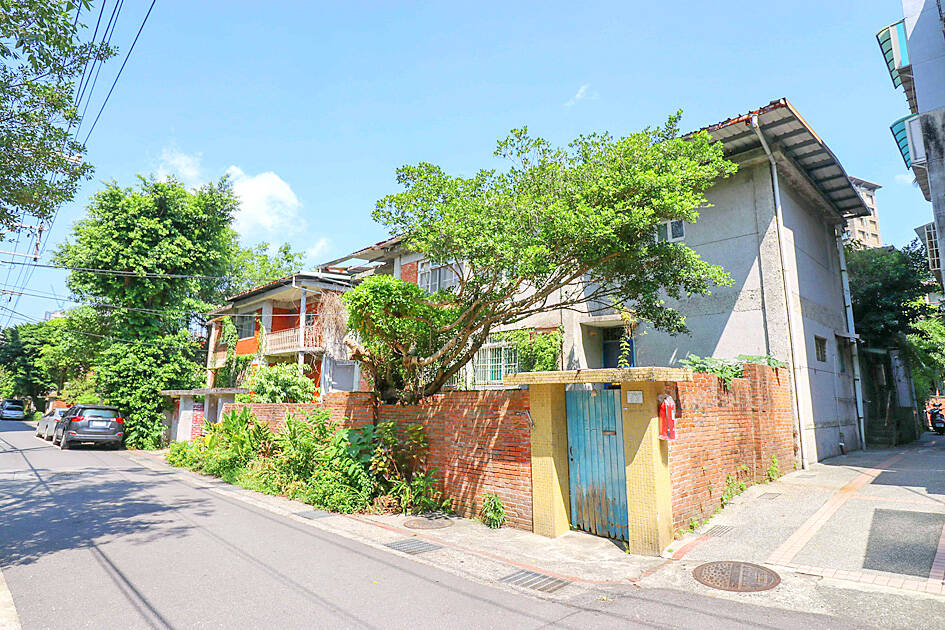National Chengchi University (NCCU) has opened a co-ed dormitory, a first in Taiwan among state-funded Taiwan universities.
The 22 duplexes are at the renovated “Huanan New Village,” in Taipei City’s Mucha (木柵) area, near the NCCU campus, a school official said yesterday.
Twenty-two out of 37 group applications were selected in a lottery draw to select who would be chosen to live in the units, which can either be shared by up to eight students if the unit has four bedrooms, or up to 10 students if it is a five-bedroom unit, officials said.

Photo courtesy of the school
Completed in 1964 for campus staff housing, the “Huanan” residence has since undergone renovation and cultural preservation work in recent years, with NCCU now allowing male and female co-habitation, and each unit is provided with beds, tables, chairs, a refrigerator and a washing machine, officials said.
The units are reasonably priced, as the total monthly rent ranges between NT$20,000 to NT$25,000 for groups of up to 10 students per house, and the cost for each student is only about NT$2,500 per month for a school term duration, officials said.
In other related news, a recent survey conducted by the Professor Huang Kun-huei Education Foundation found that Taiwanese are in favor of abolishing gender segregation at high schools, endorsing boys and girls to be taught together in classrooms during their teenage years.
Nearly all top high schools across Taiwan are unisex, said professor of education Kuo Sheng-yu (郭生玉) who headed up the survey.
“This school segregation by gender is like ‘Apartheid’ for students, It is a severe violation of the human character,” Kuo said last week.
“During a student’s teenage years, attending high school is the most critical stage for getting to know the opposite sex. The schools should not be segregated, and boys and girls should learn together in classrooms,” he added.
Survey results showed Taiwanese have more progressive concepts on gender issues, with 80 percent saying they would encourage children to challenge traditional gender roles, so that they are less restricted by norms when pursuing personal interests and professional careers, foundation director Huang Kun-huei (黃昆輝) said.
Nearly 70 percent agreed that society has changed, he said, adding that Taiwan’s traditionally male-centered mindset has diminished.

Taiwan has received more than US$70 million in royalties as of the end of last year from developing the F-16V jet as countries worldwide purchase or upgrade to this popular model, government and military officials said on Saturday. Taiwan funded the development of the F-16V jet and ended up the sole investor as other countries withdrew from the program. Now the F-16V is increasingly popular and countries must pay Taiwan a percentage in royalties when they purchase new F-16V aircraft or upgrade older F-16 models. The next five years are expected to be the peak for these royalties, with Taiwan potentially earning

STAY IN YOUR LANE: As the US and Israel attack Iran, the ministry has warned China not to overstep by including Taiwanese citizens in its evacuation orders The Ministry of Foreign Affairs (MOFA) yesterday rebuked a statement by China’s embassy in Israel that it would evacuate Taiwanese holders of Chinese travel documents from Israel amid the latter’s escalating conflict with Iran. Tensions have risen across the Middle East in the wake of US and Israeli airstrikes on Iran beginning Saturday. China subsequently issued an evacuation notice for its citizens. In a news release, the Chinese embassy in Israel said holders of “Taiwan compatriot permits (台胞證)” issued to Taiwanese nationals by Chinese authorities for travel to China — could register for evacuation to Egypt. In Taipei, the ministry yesterday said Taiwan

‘LIKE-MINDED PARTNER’: Tako van Popta said it would be inappropriate to delay signing the deal with Taiwan because of China, adding he would promote the issue Canadian senators have stressed Taiwan’s importance for international trade and expressed enthusiasm for ensuring the Taiwan-Canada trade cooperation framework agreement is implemented this year. Representative to Canada Harry Tseng (曾厚仁) in an interview with the Central News Agency (CNA) said he was increasingly uneasy about Ottawa’s delays in signing the agreement, especially as Ottawa has warmed toward Beijing. There are “no negotiations left. Not only [is it] initialed, we have three versions of the text ready: English, French and Mandarin,” Tseng said. “That tells you how close we are to the final signature.” Tseng said that he hoped Canadian Prime Minister Mark Carney

POSITIVE DEVELOPMENT: Japan and the US are expected to hold in-depth discussions on Taiwan-related issues during the meeting next month, Japanese sources said The holding of a Japan-US leaders’ meeting ahead of US President Donald Trump’s visit to China is positive news for Taiwan, former Japan-Taiwan Exchange Association representative Hiroyasu Izumi said yesterday. After the Liberal Democratic Party’s landslide victory in Japan’s House of Representatives election, Japanese Prime Minister Sanae Takaichi is scheduled to visit the US next month, where she is to meet with Trump ahead of the US president’s planned visit to China from March 31 to April 2 for a meeting with Chinese President Xi Jinping (習近平). Japan and the US are expected to hold in-depth discussions on Taiwan-related issues during the